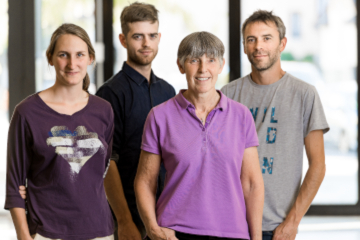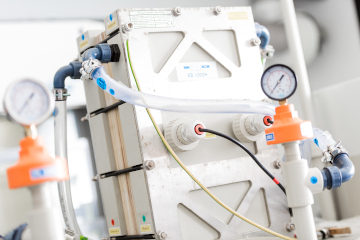Discovering Untapped Solutions
Dr. Erdelmeier has extensive experience in the chemical industry, having filled more than 15 international patents, and Innoverda is not her first foray into start-ups. She was involved in the founding of Tetrahedron in 2003, and this experience is where the roots of Innoverda can be found. During her work for Innoverda, she observed, “the simple and efficient nature of electrochemical methods,” and, with further exploration, discovered, “such methods represented a massive unrealized possibility for sustainable production technologies, particularly in organic synthesis.” Simply put, these techniques were largely absent from commercial manufacturing practices. As a result, she founded Innoverda in 2017, with the goal of integrating electrochemical methods, particularly flow electrosynthesis, into wider industrial processes.
Providing Innovative Production Processes
Innoverda´s method of electrosynthesis replaces traditional reagents in industrial processes that are often toxic or corrosive and require large amounts of energy or non-renewable materials. Instead, molecules can be transformed or activated by applying a low voltage of electricity to initiate electron transfer reactions. Through this, the same chemical reactions that are typically catalysed with harmful and costly agents can be achieved in a significantly more efficient and sustainable way, based on the “electron as sole reagent” principle. With their years of experience, Dr. Erdelmeier and the Innoverda team have developed the expertise to find the correct parameters for harnessing electrosynthesis. This technique is used to create electrochemical solutions for reducing not only environmental impact, but also cost, and may even open new process windows.*
Indeed, according to Dr. Erdelmeier, “Innoverda strives to serve as a bridge between the research lab and industrial processes.” It sells its service to clients within industry and manufacturing, testing if electrosynthesis or other electrochemical methods are applicable to their production processes. Currently, Innoverda focuses on the pharmaceutical and chemical sectors and offers its customers three levels of service: feasibility study, pre-pilot study, and small-scale production. For example, a two-week study conducted for one of the client companies predicted a high degree of feasibility for the electrosynthesis of a small peptide. A subsequent pre-pilot study showed a 38% reduction in starting material needs and a 56% reduction in the use of solvents, with a global cost reduction of 53% - gains which were then confirmed in a small-scale pilot production at the kilogram scale. Finally, Innoverda also explores the potential of electrodialysis for the treatment and purification of amino acid or peptide mixtures as a sustainable process up to the pilot scale, adding to its impressive line-up of techniques.
Advancing the SDGs through Sustainable Chemistry
Innoverda supports the principles of Sustainable Chemistry, and its innovative methods contribute to the achievement of the SDGs in a number of ways. First, it constitutes direct progress towards Goal 9 (Industry, Innovation and Infrastructure) and Goal 12 (Responsible Consumption & Production) by innovating new means of industrial production that promote the use of renewable energy as the sole reagent and limit waste. For example, in the production of a specific antibiotic, they determined the potential for a 88% reduction in CO2 emissions and a 95% reduction in waste by replacing the classical process with an electro-oxidative approach. Additionally, through the numerous positive health and environmental effects that result from these improvements, Innoverda contributes to SDGs 3 (Good Health and Well-Being) & SDG 13 (Climate Action).
The Path of a Start-Up
Innoverda has been on-boarded into the ISC3’s Global Start-Up Service (GSS) in April 2019. The start-up first encountered the ISC3 at the “Advancing Entrepreneurship and Start-Up Initiatives for Sustainable Chemistry” workshop in Berlin 2017, jointly organized by UN Environment Programme and the ISC3, in cooperation with the German Chemical Society (GDCh) and the Freie Universität Berlin. Subsequently, in May 2018, the ISC3 invited Innoverda to showcase its innovation during the Green & Sustainable Chemistry Conference, organized by Elsevier in cooperation with the ISC3 Research and Education Hub.
In the future, Innoverda plans to focus its processes also towards bio-based industries. It is developing new processes for the transformation and valorisation of biomass, as means to replacing petrochemical feedstocks with renewable raw materials.
*For more information on the emerging trend of electrochemistry and its potential, read this article from Chemical & Engineering News: https://cen.acs.org/synthesis/medicinal-chemistry/Amping-pharma-lab-Drug-companies/97/i43




